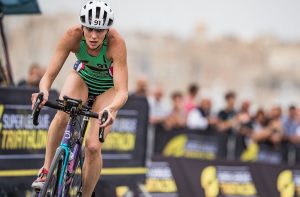- Slug: Sports–Kirsten Kasper, 930 words
- Photo available.
By Scott Sandulli
Cronkite News
PARIS – The Valley remains a prime destination for snowbirds in winter months, providing comfortable, extended holiday seasons for anyone who doesn’t feel like shoveling snow and seeing their breath in freezing conditions.
Kirsten Kasper, a native New Englander, could be classified as such, but her purpose for welcoming winter weather is different. Once the snow start falling in her hometown of North Andover, Massachusetts, Kasper hightails it for the saguaros of Scottsdale to take in the sunshine, but also to let it light the clear roads and flowing waters to pursue her life’s passion: competing in the Summer Olympics.
Her decision has paid off. Kasper, 32 competes Wednesday in the Paris Olympics’ Women’s Triathlon. She is ranked 11th in World Triathlon rankings and among those favored to win a medal.
“I set my dream of becoming an Olympian as a kid,” Kasper said. “I was always very active. My parents encouraged me to dream big, and it was something I looked forward to watching every four years in the summer.”
While she dreamed of the five rings and gold medals from day one, Kasper’s visions rarely included goggles and a bike. Fitting for a college cross-country athlete, Kasper’s journey to fulfill her Olympics aspirations has taken her from the Boston suburbs south to Georgetown University, where she was a scoring member with the NCAA women’s cross country national champions in 2011 with the Hoyas.
Her collegiate eligibility up in 2014, Kasper went hunting for a home base unaffected by the wintery coniditons of Massachusetts and D.C. to maximize her training capabilities year-round. USA Triathlon, despite Kasper’s relative inexperience on the bike or in the pool, pitched her the desert.
“I ran at Georgetown University, aspiring to make the Olympic team in track and field,” Kasper said. “After my eligibility was done, that’s when I was recruited by USA Triathlon. It was like a crossroads. Either stick to what I’m doing or trying something new. USA Triathlon believed in my abilities to make the Olympic team for triathlon. So I gave it a shot and said, ‘Why not? I could always go back to running it this doesn’t pan out.’
“It was essentially how I got started in triathlon. They recruited me out of college.”
Touching down in Arizona in the winter of 2014, Kasper soon explored the endless amounts of trails the desert hiking scene offers to increase her familiarity in triathlon.
“Most of our training happened north of the 101,” Kasper noted. “My favorite trail was Brown’s Ranch. We’d go to Sonoran Desert Reserve, Apache Watch. For cycling, I love riding Seven Springs. You got the Bartlett Dam lake road, that’s a great ride. Those were two of my key sessions. In terms of trail running, we’d do a run up to Tom’s Thumb. That was a challenging run to do. We’d start in Pima, run up Happy Valley, and get up to the trails, at least a 10 mile run.”
Even though her nonstop work in the desert didn’t pay off quickly enough to qualify for the Rio Olympics in 2016, Kasper kept at her new sport, with the perfect support system beside her on every run, ride and swim, every winter since 2015.
By her side was not only a loving husband, but Matthew Sharpe knew a thing or two about what it takes to get to the Olympics through running, swimming and biking. Sharpe, whom Kasper met in Scottsdale before later marrying, represented Team Canada in the triathlon at the Tokyo 2020 games and trained with Kasper in Arizona since the start.
“Seeing her dedication is exhausting to watch but definitely inspiring,” Sharpe said. “It’s awesome to see her achieving her dream of competing for Team USA at the Olympics.”
Having lived out that experience himself, Sharpe offers insight of just how bright the lights are on the stage of the Olympics, a notion he has hammered home to Kasper all throughout her climb up the ranks.
“I was at the COVID Olympics in Tokyo, and things were a lot more toned down in terms of the village and external things compared to what Paris is going to be,” Sharpe said. “I’m trying to plant the seed of there’s going to be a lot of external stimulus. The focus obviously is your race, dialing that in, envisioning yourself there and how you’re going to respond to being in that crazy atmosphere. I have no doubt she’ll do perfectly well.”
Since that first winter in State 48, Kasper, now a resident of Colorado, still spends at least a month training in Arizona during the cold season every year. Part of her laser-locked routine, Kasper’s work in the southwest no doubt played a major factor in her climb to a Top 25 ranking per World Triathlon, qualifying for the women’s triathlon event at the 2024 Olympics with flying colors. With the biggest race of her life upcoming, Kasper turned to old reliable Arizona to get her mind and body ready to fulfill her childhood dream in front of her family and friends.
“I was training up in the Cave Creek area this February, and one of the reasons why I decided to again make the trip down to Scottsdale is because it has been so consistent in my professional career,” Kasper said. “I knew I could get the training that I needed to prepare me for the Olympics. I wouldn’t say I’ve actually changed anything leading to this Olympics, if anything I’m sticking with what works.”
“It’s definitely been a key to my success training there in Arizona. It feels like a second home.”
For more stories from Cronkite News, visit cronkitenews.azpbs.org.
